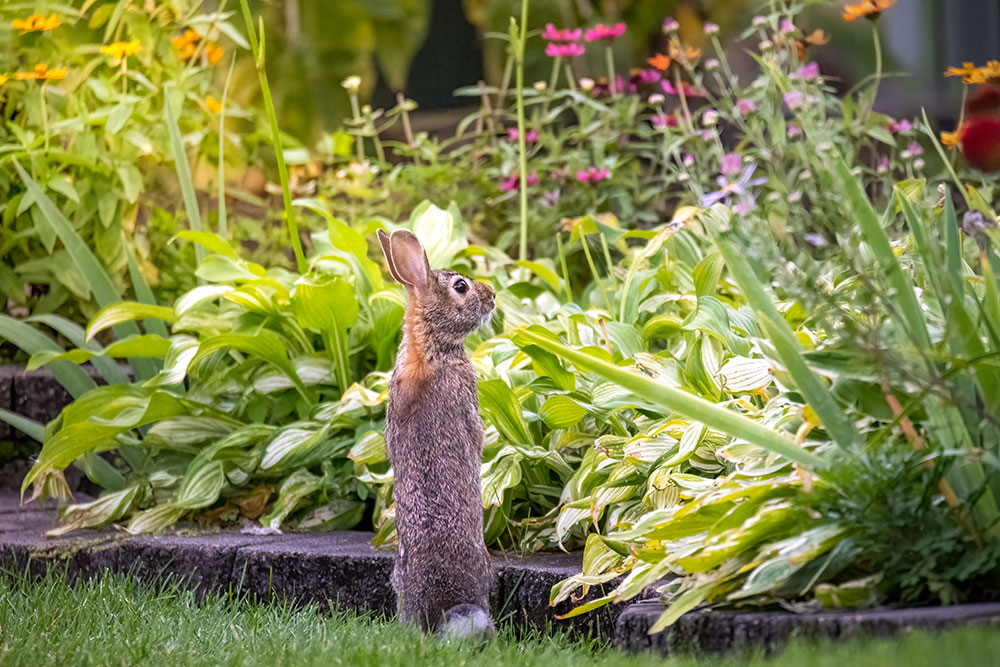Fend Off Animals from Your Garden
Jul 13, 2022

You’re not the only one who likes to eat food from the garden. Fruit and vegetable-loving animals often find cunning ways to steal your bounty before there’s a chance to harvest it. This can become frustrating as you’ve put so much effort into keeping your plants healthy.
However, before you can plan your defense, you must know who is invading. Common garden animals include deer, rabbits, racoons, squirrels, groundhogs, and birds. A tall fence may be effective for deer, but it won’t keep persistent groundhogs out.
Although there is no one-size-fits-all solution to keep out every invader, the three methods listed below will allow more of your homegrown produce to reach the dinner table.
Method 1: Build a fence
Garden invaders can be deterred with a fence; however, the specific design and height of the fence necessary will be dependent on the type of animals most often dealt with. A standard three-or four-foot fence will be effective against neighborhood dogs and other ground-bound critters, but some, such as rabbits and groundhogs, may try to burrow underneath. In these cases, bury fencing at least one foot underground to prevent unwanted entry into your garden. For deer, a two-fence system will likely be more effective. Deer can either jump high or long, but not both. A double fence, or a fence and row of hedges, will not give them the space they need to land and get inside your garden.
Method 2: Create an unwelcoming environment
If animals don’t feel safe in your garden or cannot easily access food, they will likely find another source for their next meal. To fend off small animals such as rabbits, groundhogs, and squirrels, who depend on shelter from predators, remove any hiding spots such as tall grass and shrubs. Without the comfort of these sheltering areas, they will be less inclined to visit your garden. Raised garden beds, elevated pots, and window boxes will also make the food harder to reach, discouraging ground-bound animals from stealing your vegetables.
Method 3: Use animal deterrents
Deterrents are best used in conjunction with one of the two methods above. Common deterrents include motion-activated scarecrows, ultrasonic repellents, metallic streamers, granular or liquid repellant, and predator urine. In addition, some plants are natural deterrents and can be incorporated into your garden to protect it. Marigold and peony flowers are unappealing to rabbits due to their fragrant and bitter taste, while daffodils and hyacinths are toxic to deer.
Keeping animals out of your garden may be tough but supplies from your local Co-op are sure to help you set up your defenses. Co-op carries all your garden essentials, so stop by our store or call ahead to one of our knowledgeable staff members for additional advice and tips.
For more content like this, check out the latest issue of the Cooperator.
However, before you can plan your defense, you must know who is invading. Common garden animals include deer, rabbits, racoons, squirrels, groundhogs, and birds. A tall fence may be effective for deer, but it won’t keep persistent groundhogs out.
Although there is no one-size-fits-all solution to keep out every invader, the three methods listed below will allow more of your homegrown produce to reach the dinner table.
Method 1: Build a fence
Garden invaders can be deterred with a fence; however, the specific design and height of the fence necessary will be dependent on the type of animals most often dealt with. A standard three-or four-foot fence will be effective against neighborhood dogs and other ground-bound critters, but some, such as rabbits and groundhogs, may try to burrow underneath. In these cases, bury fencing at least one foot underground to prevent unwanted entry into your garden. For deer, a two-fence system will likely be more effective. Deer can either jump high or long, but not both. A double fence, or a fence and row of hedges, will not give them the space they need to land and get inside your garden.
Method 2: Create an unwelcoming environment
If animals don’t feel safe in your garden or cannot easily access food, they will likely find another source for their next meal. To fend off small animals such as rabbits, groundhogs, and squirrels, who depend on shelter from predators, remove any hiding spots such as tall grass and shrubs. Without the comfort of these sheltering areas, they will be less inclined to visit your garden. Raised garden beds, elevated pots, and window boxes will also make the food harder to reach, discouraging ground-bound animals from stealing your vegetables.
Method 3: Use animal deterrents
Deterrents are best used in conjunction with one of the two methods above. Common deterrents include motion-activated scarecrows, ultrasonic repellents, metallic streamers, granular or liquid repellant, and predator urine. In addition, some plants are natural deterrents and can be incorporated into your garden to protect it. Marigold and peony flowers are unappealing to rabbits due to their fragrant and bitter taste, while daffodils and hyacinths are toxic to deer.
Keeping animals out of your garden may be tough but supplies from your local Co-op are sure to help you set up your defenses. Co-op carries all your garden essentials, so stop by our store or call ahead to one of our knowledgeable staff members for additional advice and tips.
For more content like this, check out the latest issue of the Cooperator.